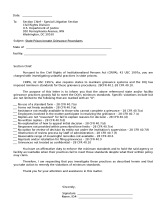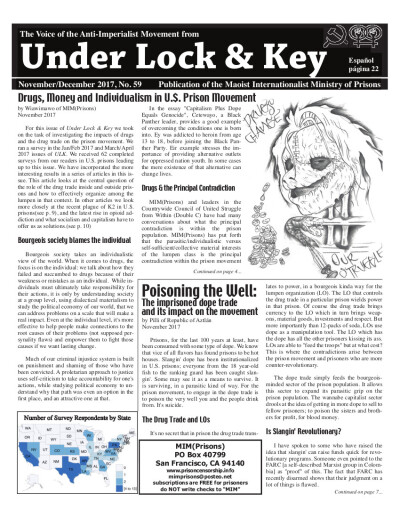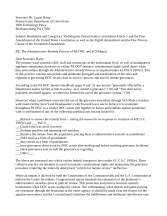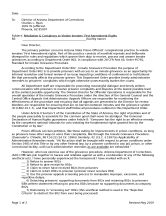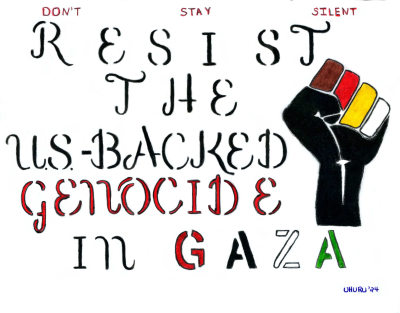I have been a member of USW since 2017. Since then I have contributed
zealously, especially the move away from publishing the revisionist
ideal of prisoners complaining about prison conditions and their
grievances, which served no purpose to the movement other than to teach
comrades revisionist methods of resolution to make prisons ideally more
comfortable and less punitive.
As I attempt a corrective analysis, I ask is writing grievances and
filing lawsuits against prison adminsistrators a revisionist ideal or
revolutionary? and if it is revolutionary, how?
I know no revolution that was won through writing grievances or use
of the courts! Read Dr. Burton’s book Tip
of the Spear and see how that ideal worked for the comrades in
the Attica Liberation Faction (ie. BPP, BLA, W.U. and all). It gets
minimum results that require the exhaustion of much energy, study of law
and money. Tip of the Spear calls for deep analysis of
revolution and how it looks when applied in multiple states and
facilities.
I am so disappointed I never received ULK 83 so I can
analyze comrades’ analysis
of Dr. Burton’s book.
Wiawimawo of MIM(Prisons) responds: I don’t know of any
USW leaders that don’t write grievances or file lawsuits. Grievances are
tactics. So we agree that no revolution has been won by grievances, just
as none is won by maintaining a website. But that doesn’t mean we
shouldn’t do these things.
To further answer your question i’d point you to Jailhouse
Lawyers: Prisoners Defending Prisoners v. the U.S.A. by Mumia
Abu-Jamal, or my review of it. In that book Delbert Africa is quoted
explaining what happens to people who go deep into fighting their case
in the courts:
“They go crazy becuz, Mu, they really believe in the System, and this
System always betray those that believe in it! That’s what drive them
out they minds, they cain’t handle that.”
As i said, we look at these things as tactics, as opposed to
strategy. Though strategically we do believe we are in a stage of legal
struggle in this country, we mean that in the broad sense. Legal
struggle in the courts is just one form of legal struggle, and not one
that we focus on.
So why engage in grievance battles and the grievance campaigns USW
has going in various states?
- To win battles that are more strategic, especially around First
Amendment rights to communicate, affiliate and just read. Fighting
censorship has always been a struggle we have put effort into because it
is a direct threat to our organizing efforts. It’s not just about making
conditions more comfortable. The most recently added grievance
petition was in Indiana, where it has already been used to help get
6-month-old mail delivered. When we distribute the petitions to
prisoners we include a cover letter where we state:
“MIM(Prisons) sees these petitions as a good use of our resources
because our ability to fairly have our grievances handled is directly
related to preventing arbitrary repression for people who stand up for
their rights or attempt to do something positive. We support this
petition in light of our anti-censorship work and anti-repression work
in general.”
An outside supporter recently expressed concerns echoing Orko’s:
“but if what it ends up being is just MIM(Prisons) helping prisoners
get their immediate personal grievances addressed, i don’t see how that
differs from the work being done by hundreds of other
reformist/bourgeois prison advocacy groups, other than that you also
offer them Maoist resources”
It is true that people use the grievance petitions for various
issues. And an individual using the petition to get some persynal issue
addressed is not contributing to the prison struggle, nor to the
anti-imperialist struggle. It is up to the comrades on the ground to use
the petitions to build an organizing base. In either case, it is a tiny
amount of time and resources that we are putting into getting petitions
into peoples’ hands. When we put in the effort to assemble articles and
conduct support campaigns, it will be around issues like censorship,
solitary confinement and political repression.
- To mobilize the masses of prisoners. The grievance campaigns have
been utilized by many to mobilize those around them for a common cause.
Mobilizing the masses to organize against state oppression is a central
task to any revolutionary movement. However, both of the critics above
pointed out that just filing grievances and petitions is only teaching
people to beg the oppressor for resolutions. It is up to USW organizers
to ensure that multiple tactics are employed in any campaign, including
tactics that contribute to building independent struggle. As we always
say, there are no rights only power struggles.
A longer debate between USW leaders over how to do this has already
appeared in a series of articles in ULK.(1) As the comrade
concluded in that first article, when the masses see the smallest
victory as a miracle and are easily pacified by it, leaders are easily
isolated by the state, so security precautions are of utmost importance
for any sustained effort. The other USW leader in that article argues
that without a strong cadre organization to frame such struggles, they
will only set the revolutionary struggle back.
There have been many cases where USW comrades report that with a lot
of struggle they barely get people to sign a petition or grievance if
the leader does all the work to write them up and make copies. In such
cases, where the masses must have their hands held to express the
slightest bit of discontent, we must conclude that we are not succeeding
in mobilizing the masses to take their destinies in their own hands.
- To appeal to the masses where they are at. In 2022, our Texas
campaign pack was one of the top referrals for new subscribers after
word of mouth and ULK. The grievance petitions are also a tool
for recruiting new comrades from the masses. Some will never be
interested in anything beyond getting their local grievances heard,
others will see the futility in relying on the system and join USW.
[We are currently out of copies of Jailhouse Lawyers by
Mumia but would happily distribute more to prisoners across the country
if anyone wants do donate copies to our Free Political Books to
Prisoners Program.]
Notes: 1. see Orientating
USW Organizing Strategy in Light of Texas Victory in ULK 72, and the
4 articles titled An Ongoing Discussion on Organizing Strategy found in
ULKs 73, 74, 76 and 77.

